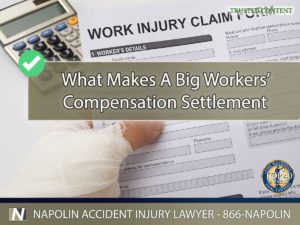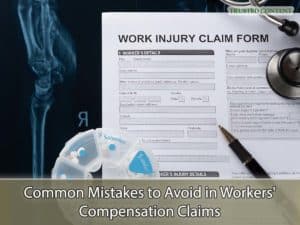What Makes A Big Workers’ Compensation Settlement
Introduction to What Makes A Big Workers' Compensation Settlement

What Makes A Big Workers' Compensation Settlement
Brief Overview of Workers' Compensation
Workers' compensation is a type of insurance that helps employees when they get hurt on the job. If you're injured at work, this insurance can cover your medical bills and some of your lost wages. It exists to protect both employees and employers, making sure that injured workers get the support they need without having to sue their employers.
Importance of Understanding Factors That Contribute to Large Settlements
Sometimes, workers' compensation cases result in large settlements for the injured employee. These settlements are important because they can help make up for lost income and cover ongoing medical expenses. In this article, we'll explore the factors that can lead to a big workers' compensation settlement. Knowing these factors can help you understand your own case and work towards getting the best possible outcome.
Factors Influencing a Large Workers' Compensation Settlement
Severity of the Injury
- Long-term effects
The worse your injury is, the more money you might get in a workers' compensation settlement. If your injury has long-lasting effects that make it hard for you to work or enjoy your life, your settlement could be larger.
- Impact on work capacity
If your injury prevents you from working the same job as before, you might get a bigger settlement. For example, if you were a construction worker and can't lift heavy objects anymore, your settlement might be higher to help you adjust to a new type of work.
The cost of Medical Treatment
- Ongoing treatment expenses
Medical bills can be expensive, especially if you need treatment for a long time. A large settlement can help cover these costs, making it easier for you to get the care you need.
- Future medical care
In some cases, you might need medical treatment for years to come. If that's true for you, a bigger settlement can help cover those future costs.
Lost Wages and Future Earning Capacity
- Time off work due to injury
If your injury forces you to miss work for a long time, your settlement might be larger to make up for the money you didn't earn while you were out.
- Potential for permanent disability
If you can't work at all anymore because of your injury, you might get a larger settlement to help support you and your family.
Vocational Rehabilitation
- Job retraining
Sometimes, people need to learn new skills after getting hurt on the job. A large settlement can help pay for this retraining, making it easier to start a new career.
- Career counseling
Finding a new job after an injury can be tough. A larger settlement might include money for career counseling, which can help you figure out what you want to do next.
Employer's Negligence
- Safety violations
If your employer didn't follow safety rules and that led to your injury, your settlement might be larger. This is because your employer is responsible for keeping you safe at work.
- Examples of negligence
Negligence can include things like not providing proper safety equipment or not training employees correctly. If your employer was negligent in some way, your workers' compensation settlement could be larger.
Proving Liability in Workers' Compensation Claims

Proving Liability in Workers' Compensation Claims
Establishing the Connection Between Work and Injury
- Causation
To get a workers' compensation settlement, you need to show that your injury happened because of your job. This is called “causation.” You might need evidence like accident reports, witness statements, or medical records to prove that your work caused your injury.
- Types of evidence
Different types of evidence can help show that your injury is work-related. For example, photos of the accident scene, emails discussing safety concerns, or even videos of the incident can all be used to support your claim.
Determining the Employer's Responsibility
- Legal obligations
Employers have a duty to keep their workers safe. This means they must follow safety laws and provide a safe work environment. If your employer didn't meet these responsibilities, they could be held responsible for your injury.
Safety standards are rules that employers must follow to keep their workers safe. These standards can include things like providing safety equipment or training employees on how to do their jobs safely. If your employer didn't follow these standards, you might have a stronger case for a larger workers' compensation settlement.
Types of Workers' Compensation Benefits
Temporary Disability Benefits
- Definition and eligibility
Temporary disability benefits help you when you can't work for a short time because of your injury. If you're hurt but expect to get better and return to work, you might be eligible for these benefits. They can help replace some of the money you're not making while you recover.
- Calculation of benefits
Temporary disability benefits are usually based on a percentage of your normal pay. Each state has its own rules for how much money you can get, so it's important to check the laws where you live.
Permanent Disability Benefits
- Definition and eligibility
If your injury leaves you unable to work permanently, you might qualify for permanent disability benefits. These benefits can help support you and your family since you can't earn money through work anymore.
- Calculation of benefits
Permanent disability benefits are also based on a percentage of your pay, but the calculation can be more complicated than temporary benefits. Factors like your age, the type of work you did, and the severity of your injury can all affect how much money you receive.
Medical Benefits
- Coverage of treatment expenses
Workers' compensation can help pay for the medical treatment you need because of your injury. This can include things like doctor visits, surgeries, and medications. The goal is to help you get better without worrying about huge medical bills.
- Limitations and exceptions
Sometimes, there are limits on what workers' compensation will cover. For example, you might have to see specific doctors or get approval for certain treatments. It's important to understand the rules in your state so you can get the care you need.
How to Maximize Your Workers' Compensation Settlement

How to Maximize Your Workers' Compensation Settlement
Document your Injury and Medical Treatment
- Importance of documentation
Keeping good records of your injury and medical treatment can help you get a larger settlement. These records can show how your injury happened, how serious it is, and what kind of treatment you need. This information can help prove your case and show that you deserve more money.
- Types of documentation
Make sure to keep copies of things like accident reports, medical bills, and doctor's notes. You should also take photos of your injuries and any damage at the accident scene. All of this evidence can help support your claim.
Consult with an Experienced Workers' Compensation Attorney
- Benefits of legal representation
A workers' compensation attorney can help you get the best settlement possible. They know the law, can guide you through the process, and can help you avoid mistakes that might hurt your case. An attorney can also help you gather evidence and negotiate with the insurance company.
- Finding the right attorney
Look for an attorney who has experience with workers' compensation cases and a good reputation. You can ask friends, family, or coworkers for recommendations, or search online for reviews.
Negotiating your Settlement
- Tips for successful negotiation
When it's time to negotiate your settlement, be prepared with all your evidence and know how much money you think is fair. Be patient and willing to work with the insurance company, but also be ready to stand up for yourself and fight for the settlement you deserve.
- How an attorney can help
A workers' compensation attorney can be a big help during negotiations. They know what arguments to make, how to present evidence, and when to push for a better deal. They can also help you understand your rights and make sure you don't settle for less than you deserve.
Common Mistakes to Avoid in Workers' Compensation Claims

Common Mistakes to Avoid in Workers' Compensation Claims
Failing to Report the Injury Promptly
- Consequences of delayed reporting
If you get hurt at work, it's important to tell your boss right away. Waiting too long to report your injury can cause problems with your claim and might even make it harder to get a settlement. The sooner you report your injury, the better.
- Statute of limitations
There's a time limit for filing a workers' compensation claim, called the “statute of limitations.” Each state has different rules, but if you miss the deadline, you might not be able to get any benefits. Make sure you know the time limit in your state and file your claim on time.
Inadequate Documentation
- Impact on the settlement
Not having enough proof of your injury and medical treatment can hurt your case. Without good evidence, it might be harder to convince the insurance company that you deserve a large settlement. Make sure you keep all your records and gather as much evidence as possible.
- Best practices for record-keeping
To keep your records organized, make a file for all your documents related to your injury. Include things like medical bills, doctor's notes, and any communication with your employer or the insurance company. Update your file regularly and make sure it's easy to find when you need it.
Not Seeking Legal Advice
- Risks of self-representation
Trying to handle your workers' compensation claim on your own can be risky. You might not know all the rules and could make mistakes that hurt your case. Without an attorney, you might also have a harder time negotiating with the insurance company and getting the settlement you deserve.
- Importance of professional guidance
Getting help from a workers' compensation attorney can make a big difference in your case. They can guide you through the process, help you avoid mistakes, and fight for the best settlement possible. Don't be afraid to ask for help if you need it.
Conclusion to What Makes A Big Workers' Compensation Settlement
Recap of Key Factors Influencing Large Settlements
In this article, we've learned about the factors that can lead to a big workers' compensation settlement. Things like the severity of your injury, the cost of medical treatment, and your employer's negligence can all play a role. To get the best settlement possible, it's important to gather evidence, seek legal help, and avoid common mistakes.
Seek Legal Help for the Best Possible Outcome
If you've been injured at work, don't be afraid to ask for help. A workers' compensation attorney can guide you through the process and fight for the settlement you deserve. Remember, you have rights, and getting the support you need can make a big difference in your recovery and your future.
- Understanding Uber Accidents and Insurance Coverage Periods in California - April 8, 2025
- A Guide on Red Light Auto Accidents in California - August 14, 2024
- Self-Representing in a California Personal Injury Claim - August 13, 2024
